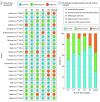Problem-Solving Skills Training for Parents of Children With Chronic Health Conditions: A Systematic Review and Meta-Analysis
- PMID: 38165710
- PMCID: PMC10762633
- DOI: 10.1001/jamapediatrics.2023.5753
Problem-Solving Skills Training for Parents of Children With Chronic Health Conditions: A Systematic Review and Meta-Analysis
Abstract
Importance: Problem-solving skills training (PSST) has a demonstrated potential to improve psychosocial well-being for parents of children with chronic health conditions (CHCs), but such evidence has not been fully systematically synthesized.
Objective: To evaluate the associations of PSST with parental, pediatric, and family psychosocial outcomes.
Data sources: Six English-language databases (PubMed, Embase, CINAHL, PsycINFO, Web of Science, and Cochrane Library), 3 Chinese-language databases (China National Knowledge Infrastructure, China Science and Technology Journal Database, and Wanfang), gray literature, and references were searched from inception to April 30, 2023.
Study selection: Randomized clinical trials (RCTs) that performed PSST for parents of children with CHCs and reported at least 1 parental, pediatric, or family psychosocial outcome were included.
Data extraction and synthesis: Study selection, data extraction, and quality assessment were conducted independently by 2 reviewers. Data were pooled for meta-analysis using the standardized mean difference (SMD) by the inverse variance method or a random-effects model. Subgroup analyses of children- and intervention-level characteristics were conducted.
Main outcomes and measures: The psychosocial outcomes of the parents, their children, and their families, such as problem-solving skills, negative affectivity, quality of life (QOL), and family adaptation.
Results: The systematic review included 23 RCTs involving 3141 parents, and 21 of these trials were eligible for meta-analysis. There was a significant association between PSST and improvements in parental outcomes, including problem-solving skills (SMD, 0.43; 95% CI, 0.27-0.58), depression (SMD, -0.45; 95% CI, -0.66 to -0.23), distress (SMD, -0.61; 95% CI, -0.81 to -0.40), posttraumatic stress (SMD -0.39; 95% CI, -0.48 to -0.31), parenting stress (SMD, -0.62; 95% CI, -1.05 to -0.19), and QOL (SMD, 0.45; 95% CI, 0.15-0.74). For children, PSST was associated with better QOL (SMD, 0.76; 95% CI, 0.04-1.47) and fewer mental problems (SMD, -0.51; 95% CI, -0.68 to -0.34), as well as with less parent-child conflict (SMD, -0.38; 95% CI, -0.60 to -0.16). Subgroup analysis showed that PSST was more efficient for parents of children aged 10 years or younger or who were newly diagnosed with a CHC. Significant improvements in most outcomes were associated with PSST delivered online.
Conclusions and relevance: These findings suggest that PSST for parents of children with CHCs may improve the psychosocial well-being of the parents, their children, and their families. Further high-quality RCTs with longer follow-up times and that explore physical and clinical outcomes are encouraged to generate adequate evidence.
Conflict of interest statement
Figures



Similar articles
-
Mindfulness-enhanced parenting programmes for improving the psychosocial outcomes of children (0 to 18 years) and their parents.Cochrane Database Syst Rev. 2024 Jan 10;1(1):CD012445. doi: 10.1002/14651858.CD012445.pub2. Cochrane Database Syst Rev. 2024. PMID: 38197473 Free PMC article.
-
Psychological interventions for parents of children and adolescents with chronic illness.Cochrane Database Syst Rev. 2019 Mar 18;3(3):CD009660. doi: 10.1002/14651858.CD009660.pub4. Cochrane Database Syst Rev. 2019. PMID: 30883665 Free PMC article.
-
Peer support interventions for parents and carers of children with complex needs.Cochrane Database Syst Rev. 2021 Dec 20;12(12):CD010618. doi: 10.1002/14651858.CD010618.pub2. Cochrane Database Syst Rev. 2021. PMID: 34923624 Free PMC article.
-
Psychological interventions for parents of children and adolescents with chronic illness.Cochrane Database Syst Rev. 2015 Apr 15;4(4):CD009660. doi: 10.1002/14651858.CD009660.pub3. Cochrane Database Syst Rev. 2015. Update in: Cochrane Database Syst Rev. 2019 Mar 18;3:CD009660. doi: 10.1002/14651858.CD009660.pub4. PMID: 25874881 Free PMC article. Updated.
-
Parent training interventions for Attention Deficit Hyperactivity Disorder (ADHD) in children aged 5 to 18 years.Cochrane Database Syst Rev. 2011 Dec 7;2011(12):CD003018. doi: 10.1002/14651858.CD003018.pub3. Cochrane Database Syst Rev. 2011. PMID: 22161373 Free PMC article.
Cited by
-
Effect of Technology-Based Psychological Empowerment Interventions on Psychological Well-Being of Parents of Pediatric Cancer Patients: A Meta-Analysis of Randomized Controlled Trials.Psychooncology. 2025 Feb;34(2):e70097. doi: 10.1002/pon.70097. Psychooncology. 2025. PMID: 39953995 Free PMC article.
-
The Effectiveness of Cognitive Behavioral Therapy-Based Intervention on Improving Sleep-Related Outcomes for People with Diabetes: A Systematic Review and Meta-Analysis of Randomized Controlled Trials.Psychol Res Behav Manag. 2024 Mar 9;17:957-972. doi: 10.2147/PRBM.S449577. eCollection 2024. Psychol Res Behav Manag. 2024. PMID: 38481598 Free PMC article. Review.
-
Latent profiles of problem-solving skills and their association with depressive symptoms in parents of children with cancer: A cross-sectional study.Asia Pac J Oncol Nurs. 2024 Nov 30;12:100633. doi: 10.1016/j.apjon.2024.100633. eCollection 2025 Dec. Asia Pac J Oncol Nurs. 2024. PMID: 39759502 Free PMC article.
-
The role of social problem-solving in emerging adult healthcare transition.Health Care Transit. 2025 Apr 5;3:100099. doi: 10.1016/j.hctj.2025.100099. eCollection 2025. Health Care Transit. 2025. PMID: 40242206 Free PMC article.
References
-
- 2020-2021 National Survey of Children’s Health (NSCH) data query. Data Resource Center for Child and Adolescent Health; Accessed July 2, 2023. Child and Adolescent Health Measurement Initiative . http://www.childhealthdata.org
-
- Mu PF, Lee MY, Sheng CC, Tung PC, Huang LY, Chen YW. The experiences of family members in the year following the diagnosis of a child or adolescent with cancer: a qualitative systematic review. JBI Database System Rev Implement Rep. 2015;13(5):293-329. doi:10.11124/01938924-201513050-00015 - DOI - PubMed
Publication types
MeSH terms
LinkOut - more resources
Full Text Sources
Medical
Miscellaneous

